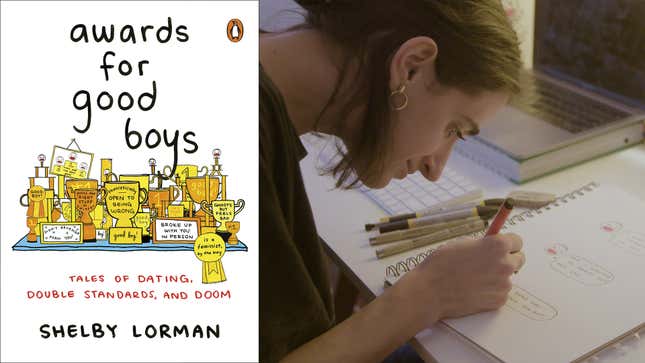Awards For Good Boys Is the Rare Instagram-Turned-Book That Actually Works
In Depth

The intersection of social media and feminism can at times be a dark, depressingly hypocritical place. The temptation to capitalize on viral liberal sentiments in the Trump era, combined with a desire to make everything cute and Instagrammable, leads to a sea of hollow progressive-sounding tweets and photos of smiling white women wearing “Girl Power” t-shirts that were made by underpaid Bangladeshi laborers who were later fired for protesting low wages.
Another trend that was likely born from this same mentality is the feminist coffee table book. These are the books you’ll often find in the miscellaneous section of Urban Outfitters with titles like Feminist Ryan Gosling or a coloring book of Boss Babes. These books are mostly fine and harmless, but their watered-down political messaging makes them superficial at best. In the face of all this, Shelby Lorman’s Awards for Good Boys: Tales of Dating, Double Standards, and Doom accomplishes something more substantial.
In the introduction, Lorman notes that she hopes readers “will be able to use what I make as a way to offload some of the emotional labor involved in walking people, especially men, through why their self-proclaimed goodness isn’t actually so great.”
The book is essentially an expanded version of her popular Instagram account, which pokes fun at society’s tendency to celebrate men just for being decent, respectful people.
Though I’m generally wary about the prospect of an Instagram-turned-book, in this case, the result is an enjoyable read that is quick, yet poignant and nuanced, much like Lorman’s comics. Awards for Good Boys is broken up into seven distinct chapters exploring topics such as identifying when a person’s perceived goodness has an ulterior motive, manspreading (both physical and metaphorical), and struggling to communicate with a man who refuses to define your relationship in clear terms. Lorman references everything from defunct MTV dating show NeXT to Pygmalion to make her points, but like many (read: all) women, Lorman has much to offer in the vein of personal experience on these fronts as well.
In candidly retelling her own dating horror stories, Lorman highlights many problematic stereotypically male behaviors, but also explores her own impact on reinforcing the knee-jerk praise Good Boys receive in media and our private lives. In addition to the titular Good Boys, her comics challenge anyone whose behavior perpetuates a patriarchal power structure—from white women struggling to check their own privilege, to TERFs, to women who try and push their compatriots toward a soft and agreeable brand of feminism. She says as much in the first chapter: “My work implicates women like me, many of whom are straight and white, because of the ways we form ourselves around and in relation to goodboydom.”
Lorman isn’t afraid to say the hard thing, even when that means saying she doesn’t have all the answers. The book ends with an activity section where readers can fill in their own awards, after an admission from the author that the book is “incomplete.”Awards for Good Boys expertly walks the line between superficial and damning. Though Lorman’s analyses of human behavior are smart and well-crafted, her book doesn’t purport to be the ultimate resource on all things feminism. It is what it is, and that self-awareness is something to celebrate.